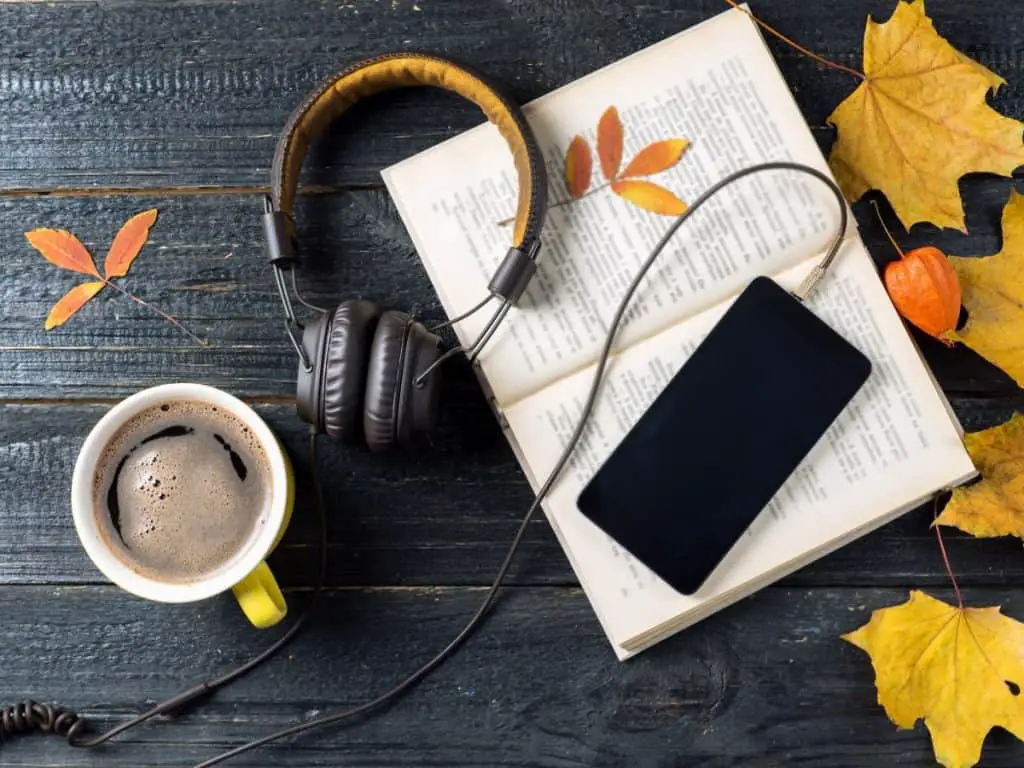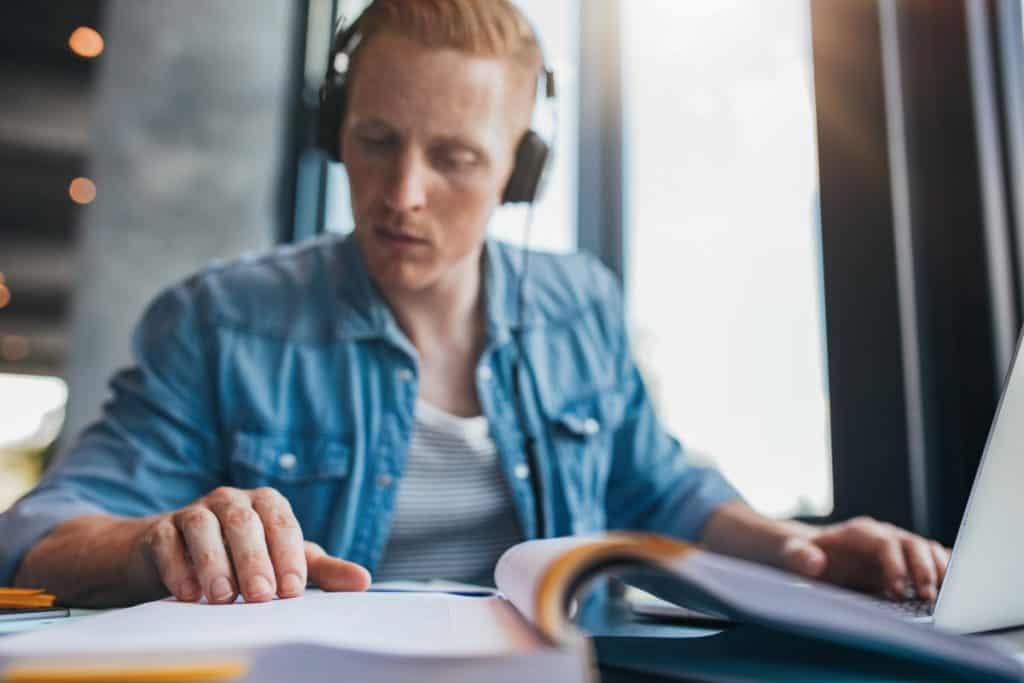Should You Study with Music? The Answer is…
It can be difficult to know the rights and wrongs when it comes to how you should study to get the most out of your time. Something that works for someone else may not work for you. You can try methods suggested by your friends, but not everyone is the same.
Wondering if you should listen to music while you study? Well I can give you a definite answer, because there is actually science to back it up. Kind of like chewing gum while taking a test. Music while studying has been proven to help ease anxiety, increase focus, and help with memorization.
If you are looking for the best study tools out there, you should read our article on the best study tools to enhance your studying at the link below:
The Ultimate Study Tools You Must Use to Succeed!
Why is it Beneficial?
Studies have shown that music produces many positive effects on both your mind and body. Music activates both your left and right brain. When this happens, your memory is improved, and you can maximize your learning experience. Silence can be deafening, but music can help your attention and retention alike.
While we are talking about improving your ability to study, check out our article that contains 25 awesome study tips to turbocharge your study time at the link below:
25 Study Tips to Transform Your Studying
Before we get started, if you are looking to improve your writing, you should really check out Grammarly. Grammarly is a godsend for those who have to write term papers, dissertations, or anything else you write that needs to be grammatically correct. Grammarly doesn’t just check grammar either. It helps you to write clearly and effectively by checking for overused words and unclear phrases. Best of all, Grammarly has a great free tier to get started with. For more information on Grammarly, click the link below:
Grammarly – Great Writing, Simplified
Music Reduces Test Anxiety
Many college and high school students suffer from anxiety. It’s become common in this day in age with all that is going on in our lives and our world. We are so overwhelmed and under pressure on a daily basis. This can become even more heightened when it comes to test taking. Test anxiety is a very common problem students face. Music can help with this.

Anxiety can genuinely become a block when you’re trying to study. How do you expect to do well when you’re so worried and continually telling yourself you won’t do well? According to a study, listening to music when facing anxiety is akin to getting a massage (Source). Who doesn’t need a massage when facing test anxiety? It is actually suggested to listen to hip hop and rap, because of its upbeat effect.
Wondering if white noise is good for studying? Find out the answer and reasons here.
Music Eases Stress
Listening to music can help reduce stress. Music can help calm your mind and put you in a positive mode that can help facilitate concentration. In terms of physiological benefits, scientists have found that music can help lower blood pressure and even relieve pain (Source).

If you are feeling stressed while reviewing notes or reading a textbook, throw on some tunes. It can truly help you deal with your emotions and connect. Why do you think athletes blare music before they run onto the field to face their opponents? Because it hypes them up and eases their stress. In this case, you’re the athlete and your test is the other team. Pump yourself up and listen to a little inspiration from Lizzo as you tackle your study session. When she asks “Baby how you feelin?” you should be able to say “Ready to ace this test!”
Focus
According to a Stanford study, music allows the brain to give its full attention to the task at hand (Source). They claim classical music, like that by Mozart, Bach, and Beethoven can help students categorize information, which is obviously a key part of studying for a test. They say this music will help you better pay attention, make predictions and memorize events. The music you choose is key, because it will help decide the way your brain will process information.

Listening to music is kind of like exercising your brain. Several studies have linked music to memory and emotion. You know how you’ll listen to a song from when you were 12 and all the memories come flooding back? This can happen with studying. If you listen to ‘Lights Up’ by Harry Styles on repeat while studying the quadratic formula, you’ll probably think of the quadratic formula every time you listen to that song for the rest of your life. Music literally triggers memories which can be amazing for retention while studying.
You can remember all the lyrics to the Jonas Brothers’ ‘Year 3000’, but can’t remember what a synonym is? This proves that music, memory, and emotion are all linked. Your brain is constantly looking for patterns to better understand, recall, and process info. This is where music can help.
Music Makes You Happier

Listening to music has been proven to increase your body’s dopamine levels (Source). Dopamine is a neurotransmitter that promotes feelings of joy. Studies have shown that people are better at solving problems when they are in a good mood. The worse your mood, the more frustrating difficult concepts are going to be for you to comprehend.
Sleep
Getting a full eight hours of sleep is the key to being an active student. If you are calmer, you are more likely to get better sleep. If you aren’t exhausted, you will have a more productive day of studying.

Background music is helpful because students are more focused and motivated when they are in a good mood, which helps them endure studying for a longer time. Then once that effective study session has been completed, there is no need to stay up all night to continue studying. Students can go to bed at a reasonable hour and wake up prepared and ready for their upcoming exam.
Use it as a Motivation Tool
Feeling low on energy and need a pick me up? Throw on some music and wake yourself back up. Dance, sing along, and get your heart rate up. Music can act as a stimulant for motivation. This can help quicken the pulse, accelerate breathing, and draw away attention from fatigue and boredom. It’s almost like a super healthy espresso shot.

You can also use music as a motivational reward. Tell yourself you can listen to your favorite song after you finish chapter 16. It’s a nice break that will also help your brain and body.
Drowning Out Distractions
Some people find music to be distracting in itself, but it can actually be used as a tool to avoid distractions. If you study in a coffee shop or a busy library or study hall, putting in your earbuds can be incredibly helpful. Instead of being distracted by other people’s conversations, videos playing on their smartphones, and a barista yelling “Frappuccino for Sarah! Macchiato for Mike! Pumpkin Spice Latte for Natasha!” constantly, you will be able to better focus while listening to music.

Whether classical music or music with lyrics, it will more than likely be able to help you focus on the task at hand. Of course if you can, study someplace more quiet like your dorm or bedroom. But for some, I get that might not be possible. If you have a ton of classes and a job and an internship, sometimes you just have to study wherever and whenever you can. Music (in earbuds or noise-cancelling headphones!!) (affiliate links) can honestly save your study session and your test grade.
Make Studying Fun
Music can help make completing monotonous tasks easier. Reading your notes or textbook vocab to the beat of a song can genuinely make the content easier to remember. Who knows, maybe you’ll be inspired to write a song about median numbers to the tune of ‘The Middle’ by Maren Morris. You see teachers do it all the time in viral videos, it actually works!

You may not be able to listen to the same songs during your test but having them play in your head may bring back information to your mind that you would not have remembered without it. Again, there’s a reason we remember lyrics to songs we haven’t heard in years. As humans, we love and connect with music, because it makes us feel good. It’s like riding a bike… you never really forget. Try out this method and see if it works for you.
No Lyrics Necessary?
Most experts encourage you to stick to classical music while studying, but personally I don’t think that’s completely necessary. Classical is great if you enjoy that type of music, because it calms you down and increases your productivity.
You could also benefit from listening to ambient sounds. There are tons of apps in the App Store that play sounds of thunderstorms, streams, wind, rain, and rivers to help calm you as well. So, if music is not your thing or you feel like it distracts you, try one of these sounds so you can still benefit from something besides pure silence.

Many claim that no lyrics is best so it doesn’t distract you. But, I don’t think songs with lyrics are bad as long as you know them by heart and don’t spend your study session looking up Drake lyrics instead.
The volume of music can be important as well. Don’t blast the music and drown out your thoughts. You want the music to be a background of your thoughts and reading.
Why Can’t I Just Play a TV Show in the Background?
It can be tempting to pull up Disney + on your iPad and binge the Simpsons while you study? Same effect as playing music in the background right? Not quite.
Ohio State University found that watching television while studying makes the student feel “emotionally satisfied”, but will not make them perform at their best ability. Students feel good emotionally because the study process was more enjoyable, but they didn’t gain anything cognitive from it (Source).

TV will just distract you. I guarantee it. Multitasking does not work well when it comes to preparing for a test or big project. Listen to music instead. It will boost you both emotionally and cognitively.
The Mozart Effect
Have you ever heard of the Mozart Effect? The Mozart Effect is the idea that listening to Mozart makes solving spatial tasks easier.
This is why some parents play their children Mozart music in hopes of making them more intelligent. Many even play Mozart for their child when they are still pregnant.
The method was first mentioned in 1993 by scientists at the University of California, Irvine. The study found that subjects who listened to Mozart showed significantly increased spatial reasoning skills for at least 10-15 minutes.

We can’t conclude that listening to Mozart will make you a genius. Yet, it’s worth a try to listen to his music while your studying just in case it opens your mind even a little more.
The Mozart Effect is claimed to be misleading by some who call it the “Mozart Myth.” Try it out for yourself to see which side you are on.
Why You SHOULDN’T Study with Music
Some believe you should not listen to music while studying, because it can hinder learning. Loud or angry music can have negative effects on reading comprehension and mood. It is also argued that information is not absorbed enough because it can be a distraction.
Information recall can be more effective when it’s done in a similar environment as the one it was learned in. It is rare to take a test in a classroom that is playing Shawn Mendes. So, some say it is better to study in silence since you will be likely taking your test in silence.

Some people say that your brain struggles to process the lyrics and focus on studying at the same time. This multitasking can supposedly decrease your IQ by ten points (Source). This is why as I mentioned before, make sure you’re listening to a song you know all the words to if you do listen.
You Need to Know You
Experts could argue this topic back in forth all day, but in the end, it is all about knowing what works best for you. You need to know how you best focus. If you know that singing along to Post Malone is going to distract you, try some Mozart instead. If you hate classical music, try some Ed Sheeran. If you try it and feel you learned nothing during that study session, try ambient nature sounds during your next study session. It all comes down to what works for you and only you.
You will only be able to figure out your perfect study session method with trial and error. Music is a great place to start with that.

Create your own study playlist and adapt it when you find a song that distracts you. Replace each of those songs with another that you think will distract you less. Some trial and error is going to be necessary to find a study session playlist that you can rely on.
In Conclusion
Knowing whether or not you should listen to music while studying mainly depends on who you are personally. If you get distracted easily, maybe you would be more efficient if you have your study session in silence. If you thrive on some background noise, maybe you should add music into your routine, because it has been proven to be beneficial for both your brain and body.
Playing music while studying can:
- Reduce test anxiety
- Ease stress
- Help you focus
- Make you happier
- Help you get more sleep
- Motivate you
- Drown out distractions
- Make studying fun
You will need to determine what genre or type of music works best for you. You can try classical music, songs with lyrics, and even ambient nature sounds. Once you find something that helps you feel better and better focus, stick with it. Although many people believe in the Mozart Effect, that might not be the right choice for you, although it very well could be.
Don’t think that just because music can help you to study that TV or an audiobook will. Binging Stranger Things on Netflix or listening to Harry Potter on tape is going to immerse you into another world besides the one you’re in. It can be more exciting than studying economics, we all know this. So just don’t do it. If you can’t study in silence, try music or some rain sounds.

Experts and study conductors can say all they want, but this topic is based on your personality and your situation. Who you are, where you are, what you are studying, and with who are all factors that will contribute to determining if listening to music while studying is right for you. The best thing to do is to try different study methods with and without music, with different genres and different sounds. Once you find something that works, keep trying it. See how your test scores reflect those changes. Music is such an important part of our world no matter the culture or place for a reason. It can heal us, bring us calm and happiness, and help us focus. Try playing some music next time you study and see what it can do for you.
“Ah, music,” he said, wiping his eyes. “A magic beyond all we do here!”
― J.K. Rowling, Harry Potter and the Sorcerer’s Stone
Want More Tips and Tricks? Subscribe to our Newsletter!
If you haven’t already subscribed, please subscribe to The Productive Engineer newsletter. It is filled with tips and tricks on how to get the most out of the productivity apps you use every day. We hate spam as much as you do and promise only to send you stuff we think will help you get things done.
Check Out Our YouTube Channel!
We have a YouTube channel now and we are working hard to fill it with tips, tricks, how-tos, and tutorials. Click the link below to check it out!
Check out our Resources page
Check out our resources page for the products and services we use every day to get things done or make our lives a little easier at the link below:







